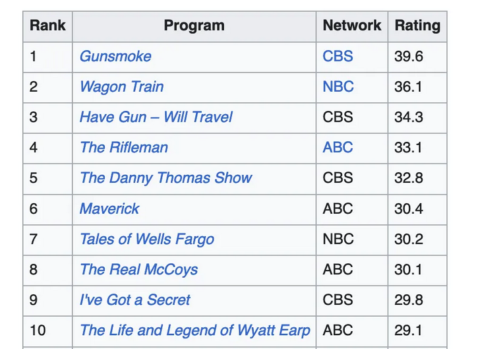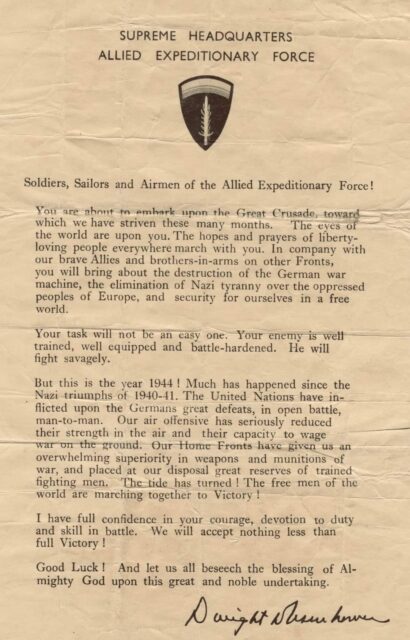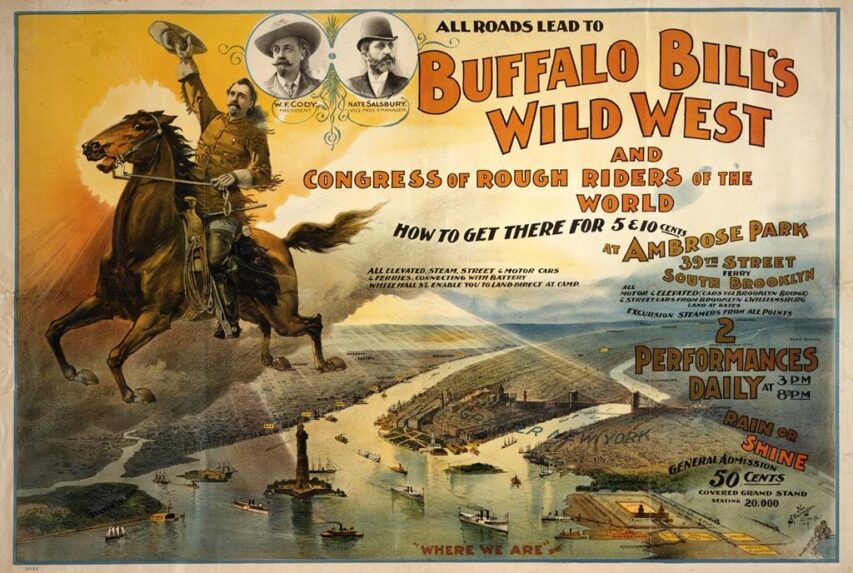World War Two
Published 5 Jun 2024Now that Japan is the only Axis power still in the fight, Allied forces — especially American ones — must redeploy to prepare for the final invasion of the Japanese Home Islands. But how do you move millions of men halfway around the globe? And which ones go — veterans, new recruits, or some combination? Who decides? Where exactly do you send them to prepare too, with some many eastern ports like Manila a shambles? Let’s take a look.
(more…)
June 7, 2024
Redeployment! – Millions of men from Europe to Asia
June 6, 2024
The reason Germany failed on D-Day (Ft. Jonathan Ferguson)
Imperial War Museums
Published Jun 5, 2024Adolf Hitler was looking forward to D-Day. His plan was simple. Reinforce the western defences, launch a furious counterattack, and “throw the Allies back into the sea”. After that, he could turn his full strength against the Soviet Union and end the war. For Hitler, the outcome of this campaign would be decisive.
In the previous episode of our D-Day series we looked at the air battle for Normandy. This time IWM Curator Adrian Kerrison covers the fighting on land. Why were some beaches bloodier than others? Why did German counterattacks fail? And why did it take so long for the Allies to breakout?
To help us answer some of those questions we’ve brought in the Royal Armouries’ Jonathan Ferguson to look at some of the most important weapons of D-Day.
(more…)
QotD: Herbert Hoover as Woodrow Wilson’s “Food Dictator”
In 1917, America enters World War I. Hoover […] returns to the US a war hero. The New York Times proclaims Hoover’s CRB work “the greatest American achievement of the last two years”. There is talk that he should run for President. Instead, he goes to Washington and tells President Woodrow Wilson he is at his service.
Wilson is working on the greatest mobilization in American history. He realizes one of the US’ most important roles will be breadbasket for the Allied Powers, and names Hoover “food commissioner”, in charge of ensuring that there is enough food to support the troops, the home front, and the other Allies. His powers are absurdly vast – he can do anything at all related to the nation’s food supply, from fixing prices to confiscating shipments from telling families what to eat. The press affectionately dubs him “Food Dictator” (I assume today they would use “Food Czar”, but this is 1917 and it is Too Soon).
Hoover displays the same manic energy he showed in Belgium. His public relations blitz telling families to save food is so successful that the word “Hooverize” enters the language, meaning to ration or consume efficiently. But it turns out none of this is necessary. Hoover improves food production and distribution efficiency so much that no rationing is needed, America has lots of food to export to Europe, and his rationing agency makes an eight-digit profit selling all the extra food it has.
By 1918, Europe is in ruins. The warring powers have declared an Armistice, but their people are starving, and winter is coming on fast. Also, Herbert Hoover has so much food that he has to swim through amber waves of grain to get to work every morning. Mountains of uneaten pork bellies are starting to blot out the sky. Maybe one of these problems can solve the other? President Wilson dispatches Hoover to Europe as “special representative for relief and economic rehabilitation”. Hoover rises to the challenge:
Hoover accepted the assignment with the usual claim that he had no interest in the job, simultaneously seeking for himself the broadest possible mandate and absolute control. The broad mandate, he said, was essential, because he could not hope to deliver food without refurnishing Europe’s broken finance, trade, communications, and transportation systems …
Hoover had a hundred ships filled with food bound for neutral and newly liberated parts of the Continent before the peace conferences were even underway. He formalized his power in January 1919 by drafting for Wilson a post facto executive order authorizing the creation of the American Relief Administration (ARA), with Hoover as its executive director, authorized to feed Europe by practically any means he deemed necessary. He addressed the order to himself and passed it to the president for his signature …
The actual delivery of relief was ingeniously improvised. Only Hoover, with his keen grasp of the mechanics of civilization, could have made the logistics of rehabilitating a war-ravaged continent look easy. He arranged to extend the tours of thousands of US Army officers already on the scene and deployed them as ARA agents in 32 different countries. Finding Europe’s telegraph and telephone services a shambles, he used US Navy vessels and Army Signal Corps employees to devise the best-functioning and most secure wireless system on the continent. Needing transportation, Hoover took charge of ports and canals and rebuilt railroads in Central and Eastern Europe. The ARA was for a time the only agency that could reliably arrange shipping between nations …
The New York Times said it was only apparent in retrospect how much power Hoover wielded during the peace talks. “He has been the nearest approach Europe has had to a dictator since Napoleon.”
Once again, Hoover faces not only the inherent challenge of feeding millions, but opposition from the national governments he is trying to serve. Britain and France plan to let Germany starve, hoping this will decrease its bargaining power at Versailles. They ban Hoover from transporting any food to the defeated Central Powers. Hoover, “in a series of transactions so byzantine it was impossible for outsiders to see exactly what he was up to”, causes some kind of absurd logistics chain that results in 42% of the food getting to Germany in untraceable ways.
He is less able to stop the European powers’ controlled implosion at Versailles. He believes 100% in Woodrow Wilson’s vision of a fair peace treaty with no reparations for Germany and a League Of Nations powerful enough to prevent any future wars. But Wilson and Hoover famously fail. Hoover predicts a second World War in five years (later he lowers his estimate to “thirty days”), but takes comfort in what he has been able to accomplish thus far.
He returns to the US as some sort of super-double-war-hero. He is credited with saving tens of millions of lives, keeping Europe from fraying apart, and preventing the spread of Communism. He is not just a saint but a magician, accomplishing feats of logistics that everyone believed impossible. John Maynard Keynes:
Never was a nobler work of disinterested goodwill carried through with more tenacy and sincerity and skill, and with less thanks either asked or given. The ungrateful Governments of Europe owe much more to the statesmanship and insight of Mr. Hoover and his band of American workers than they have yet appreciated or will ever acknowledge. It was their efforts … often acting in the teeth of European obstruction, which not only saved an immense amount of human suffering, but averted a widespread breakdown of the European system.
Scott Alexander, “Book Review: Hoover”, Slate Star Codex, 2020-03-17.
June 5, 2024
Hollywood has been here before … and they learned nothing
Ted Gioia illustrates the mind-blowing dominance of westerns on TV and in the theatre in the 1950s and how quickly the boom was over and has never come close to recovering:

Source – https://en.wikipedia.org/wiki/Top-rated_United_States_television_programs_of_1958%E2%80%9359
Eight of the top ten shows during the 1958-59 season were westerns.
Spaceships were in the news every day back then, but on TV it was just horses — and occasionally a covered wagon. Each of the three networks was caught up in a time warp, partying like it was 1899.
Any fool could see that they were saturating the market. Yet the studios kept launching new westerns with regularity, although with less confidence, for another decade, more or less.
Back in 1955, the three US TV networks had introduced three new western-themed series — Gunsmoke, Cheyenne, and Wyatt Earp. But two years later, the networks ramped up their investment in cowboys, launching nine new westerns that fall.
And it got worse.
In 1958, these three networks introduced ten more western series. On some nights, you could watch cowboys for two hours straight on ABC. CBS and NBC also started scheduling back-to-back Wild West shows.
I need to stress that the western was already an exhausted genre long before 1960. Movie theaters had relied on cowboys as an audience draw going back at least to Broncho Billy Anderson and The Great Train Robbery (1903).
And cheap books and magazines with stories of the Wild West had already been around for decades at that point. By my measure, nostalgia for the old West dates back to the launch of Buffalo Bill’s Wild West show on May 19, 1883 in Omaha, Nebraska — four years after the invention of the gasoline engine.
[…]
Younger viewers were the first to abandon the western — a telling sign, especially when you consider that, back in the 1930s, children and teens had been the core audience for the genre.
By the time Gunsmoke went off the air in 1975, the few remaining fans were old-timers — maybe the same ones who had gone to movie theaters to cheer for Roy Rogers in the 1930s. That show had been the most popular TV series in the US for four seasons in the late 1950s. But a cowboy series would never do that again.
Youngsters lost interest in westerns despite a proliferation of merchandise. During my childhood, I paid no attention to the cowboy genre — nor did any of my friends. But brand merchandise was everywhere. We could buy Gunsmoke comic books, trading cards, lunchboxes, and — of course! — toy guns, among other paraphernalia.
With the benefit of hindsight, we can see that these products did not develop the market — they merely saturated it.
What Troops Ate On D-Day – World War 2 Meals & Rations
Tasting History with Max Miller
Published May 21, 2024D-Day Scrambled Eggs and Bacon served with toast and D-Day Lemonade
City/Region: United States of America
Time Period: 1944The food in the final days leading up to D-Day was a definite improvement over the sad, dry sandwiches some soldiers had been getting. All-you-can-eat meals of steak, pork chops, sides, lemon meringue pie, ice cream, and even popcorn and candy during movie screenings kept the sequestered troops well fed. The last meal served before the landing was breakfast in the very early hours of the morning, said by many to be scrambled eggs and bacon.
This meal was made in the south of England, but the bacon was from the U.S., so American-style bacon is best here. The eggs don’t taste bad, but the texture is not like fresh scrambled eggs at all (more like tofu). The bacon is real, though, and that really saves the dish. Powdered eggs can be found online and at camping stores.
No. 749. Scrambled Eggs
Water, cold … 2 1/2 quarts (2 1/2 No. 56 dippers)
Eggs, powdered … 1 1/2 pounds (1/2 3-pound can)
Salt … To taste
Pepper … To taste
Lard or bacon fat … 1 pound (1/2 No. 56 dipper)Sift eggs. Pour 1/3 of the water into a utensil suitable for mixing eggs. Add powdered eggs. Stir vigorously with whip or slit spoon until mixture is absolutely smooth. Tip utensil while stirring.
Add salt, pepper, and remaining water slowly to eggs, stirring until eggs are completely dissolved.
Melt fat in baking pan. Pour liquid eggs into hot fat.
Stir as eggs begin to thicken. Continue stirring slowly until eggs are cooked slightly less than desired for serving.
Take eggs from fire while soft, as they will continue to thicken after being removed from heat.No. 750. Diced Ham (or Bacon) and Scrambled Eggs
Add 3 pounds of ham or bacon to basic recipe for scrambled eggs; omit lard. Fry ham or bacon until crisp and brown.
Pour egg solution over meat and fat. Stir and cook as in basic recipe. Additional fat may be needed if ham is used.
— TM 10-412 US Army Technical Manual. Army Recipes by the U.S. War Department, 1946
June 4, 2024
How Wall Street billionaires are reacting to the verdict against Trump
Under normal circumstances, you might think that Trump would find doors closed to him among the big-money folks on Wall Street after his trial ended with 34 guilty verdicts … yet the opposite is reported to be happening and his campaign is being inundated with big financial donations:
My quite strong suspicion is that Leticia James and Alvin Bragg have caused alarm by targeting business records and real estate valuations in corporate borrowing, things that everyone shares in finance, insurance, and real estate, for criminalization and destructive litigation. My bet is that capital is turning hard against lawfare, seeking to disincentivize and punish an attack on the basics of corporate business. People in business are horrified by a flamethrower of a prosecution over old business records.
So Bloomberg’s interpretation is that Wall Street is standing with Trump despite the verdict, but my bet is that Wall Street, Silicon Valley, and other business interests are turning against Democrats because of the verdict — because Democratic prosecutors in New York (and especially Manhattan), America’s financial capital, are doing things like turning seven year-old business record misdemeanors into a long list of Frankenstein felonies.
That interpretation makes capital’s support for Trump self-interested rather than morally outraged, though not over Bloomberg’s explanation of lower taxes, as people who keep business records turn against the party that bizarrely overcriminalizes the handling of business records when the target becomes politically unfashionable. If capital turns against the Democratic Party — if the ATM machine stops spitting out campaign funding — the moment becomes pretty significant, and Alvin Bragg becomes the dog who caught the car.
Assassination-to-order, or war by other means
I was not well-informed about the goings-on within Vladimir Putin’s Russia even before the Russo-Ukrainian war went into high gear and disrupted all information from that part of the world and I hear much but trust nothing I’ve been hearing since then. kulak, on the other hand, seems to have paid much closer attention to Russian internal affairs, including one particular political assassination:
On August 20, 2022, 29 year old Daria Dugina was killed in a car bombing on the outskirts of Moscow. The bomb, it was widely agreed, had been intended for her father the famed/infamous Russian philosopher Alexander Dugin (whose works are now shockingly hard to get in English and appears on my “Real Banned Books List“), and while there were lots of deflections and denials, it was fairly widely agreed the plot had been carried out with US and UK backing by Ukrainian-aligned insurgents and agents within Russia.
Indeed many US aligned “Journalists”, “Open Source Intelligence” types, Bellingcat-associated influencers, and other CIA-aligned carve outs openly CELEBRATED the death of Daria, since she had been involved in Putin-aligned political youth organizing.
Of course, the fact political volunteers and door knockers have NEVER been considered legitimate military targets, nor the fact the real target was a PHILOSOPHER and everything he had ever done would have been perfectly legal to do even within the United States under the auspices of the first amendment … that somehow never occurred to these commentators. Nor the wider US intellectual class, and somehow neither did the natural logical conclusion.
Russia is by and large NOT run by its political organizers and academics. You could probably kill 1000 Russian university professors and it wouldn’t unbalance the Russian state too extraordinarily. Russia is run by a combination of old Soviet secret policemen, gangsters, and crooked/”reformed” oligarchs all attempting to reorganize themselves into a somewhat respectable upper-class, with a blend of impressive and farcical results.
Before he was killed in an internal power struggle the former head of Wagner PMC Yevgeny Prigozhin embodied this, turning from a St. Petersburg gangster, to a prisoner, to a (definitely money laundering) caterer for the presidential palace, to the head of a PMC mercenary company. Every prominent person in Russia has a career like this Right down to Putin going from a KGB officer, to a gangster/political fixer, to president … Every elite member of Russian society is basically leading a life ripped right from Grand Theft Auto IV, complete with the eternal struggles of trying to “go legit” and formalize everything as a normal upper-class elite, to being dragged back into gangsterism or even Soviet power struggles by their complex past.
Put simply the actual Russian Elite are not people very intimidated by assassination. They’ve all known people to be killed in power struggles, espionage, and criminal altercations, and are used to the anxiety that death might wait for them around the corner. And the US and Ukraine lashing out at academics who might be intimidated doesn’t really affect them.
However, if the Russian state did the logical tit-for-tat escalation and responded in kind … that would shake America to its knees. America actually IS run by its academics, political organizers, and bureaucrats. And almost none of the people with power have a gangster or KGB agent’s stoic familiarity with death and danger.
Killing a Russian Academics daughter did very little to the Russian state… It’d be a very different story for Russia’s armed agents to do the same in America and kill Chelsea Clinton, daughter of current Columbia professor Hillary Clinton.
It’s be a very different story if Russia assassinated Brookings senior fellow Robert Kagan, husband of former under-secretary of state Victoria Nuland. Or any number of Harvard, Stanford, Yale or Princeton political philosophers or International Relations commentators, or members of their family.
One can imagine the headlines if John Hopkins and RAND fellow Francis Fukuyama was so killed:
“It is the end of Fukuyama”
– History
And again remember, though the various income streams of the US elite may resemble embezzlement, protection rackets, and money laundering … these aren’t gangsters. These are complacent, highly agreeable, shockingly unoriginal and cowardly … academics and bureaucrats.
Indeed one can imagine Putin weighing the risk of such a reprisal and then deciding against it, not out of ethical concerns, but because the American ruling class is too unpredictable and prone to womanly hysterias.
Indeed amongst the few senior American and Ukrainian officials who knew of the attack beforehand you can imagine them salivating that Putin might respond in kind and the subsequent freakout might commit the US to joining the war (one of the few scenarios where Ukraine could possible survive against their overwhelming odds).
Snipers in World War 1
The Great War
Published Feb 9, 2024In fall 1914, the British and French armies on the First World War’s Western Front were wrestling with a problem: unseen German riflemen were picking off any man who showed himself above the trench. Something had to be done about it – and the result was the birth of the modern sniper.
(more…)
June 2, 2024
Japan vows to fight to the end! – WW2 – Week 301 – June 01, 1945
World War Two
Published 1 Jun 2024This week President Truman and his aides meet to discuss the use of the atomic bomb. In Japan, the Imperial government vows to fight on even as Yokohama is turned to ash by firebombing. On Okinawa, Japanese 32nd Army withdraws from the defences of Shuri Castle but there is still plenty of hard fighting left for the Americans. There are US Navy command reshuffles and the stage is set for an Allied conference in Potsdam.
Chapters
01:21 Recap
05:08 The Fight on Okinawa
08:38 The Interim Committee And The Bomb
14:02 Notes
(more…)
A definite sign of the end-times – “South Park is going into its 27th season”
I’d pretty much given up on watching anything on television around the time that South Park went on the air, so I never “stopped watching it” because I wasn’t watching anything on TV by that time (although I did see Team America: World Police in the theatre). Andrew Sullivan says I’ve been missing something quite worthwhile for all this time:
South Park is going into its 27th season. And it has rarely been better. (I simply can’t believe so many people I meet say they haven’t watched in years. You’ve been missing out!) The new special on obesity — a deft masterclass of social commentary — has a brutal takedown of suburban white women jonesing for doses of Ozempic like meth-heads; a definitive — and musical! — digression into the insanity of the American healthcare system; pure, character-driven humor in a figure like Randy Marsh — a far subtler parody of the average American male than Homer Simpson; and, of course, Eric Cartman — the “big-boned” fat-ass kid whose capacity for pure evil was first truly captured in the epic “Scott Tenorman Must Die“.
You can read books on Ozempic, scan op-eds, absorb TikToks, and even listen to the Dishcast! — but nothing out there captures every single possible social and medical and psychological wrinkle of this new drug than this hour of crude cartoons. Yes, there are fart jokes. There are always fart jokes. But fart jokes amid a sophisticated and deeply informed parody of insurance companies? Or, in other episodes, toilet humor guiding us through the cowardice of Disney, the dopey vanity of Kanye, the wokification of Hollywood, the exploitation of black college athletes, the evil of cable companies, the hollowness of hate-crime laws, the creepiness of Christian rock, or the money-making behind legal weed? Only South Park pulls this off. Only South Park gets away with all of it.
It’s a 1990s high-low formula at root, sophisticated cultural and political knowingness married to crude cartoons, silly accents, m’kay, and a talking Christmas turd, Mr Hankey. Generationally, it really marked a moment when merging these two worlds seemed the most creative option — not an abandonment of seriousness, but the attachment of a humane levity to it. South Park can be brutal, but it is never cruel. Unless you’re Barbra Streisand or Bono. And virtually every character (even Eric) is redeemable. Except Meghan Markle.
Yes, Matt and Trey have tried other things. To wit: just one of the best and most successful musicals of the 21st century, The Book of Mormon. They’ve pioneered deep-fakes. They also just renovated and relaunched a huge Denver restaurant they loved as kids, Casa Bonita, memorialized in a classic Cartman-is-evil episode. Twenty years ago, they actually created an entirely puppet-acted movie with epic sex and vomit scenes as a commentary on the war on terror, Team America; and are now teaming up with Kendrick Lamar to shoot a live-action comedy about a biracial couple where the black boyfriend interns as a slave re-enactor only to discover that his ancestors were owned by his girlfriend’s. No landmines there.
But they always return to South Park and evince no desire to transcend it — partly because it has become an entire world that can expand and contract at will: a world where Mel Gibson tweaks his nipples and smears his feces, Mickey Mouse acts like a mafia don, Michael Jackson’s nose falls off, Meghan Markle is a literal empty vessel, Christopher Reeve eats fetuses for their stem-cells, and Tom Cruise works in a fudge factory where, yes, he does a lot of the packing.
And in two decades of an acutely polarized and politicized culture, what team is South Park on? Precisely. You can’t tell, can you? — which is a staggering achievement in its own right. And it’s not about risk-aversion: the duo was targeted by Islamist terror and didn’t blink. They also took on the censors at the MPAA — savor this memo — and obliterated one of George Carlin’s “Seven Words You Can Never Say on TV” by saying “shit” 162 times in one episode.
They’ve shown Martha Stewart putting a whole turkey up her back-hole, Paris Hilton putting a whole pineapple up her front-hole, Caitlyn Jenner running over innocent pedestrians, and Jesse Jackson demanding that his big black ass be ceremoniously kissed. They’ve tackled Scientology and Mormonism; they’ve shown intergalactic Catholic priests astonished at the idea they have to stop raping young boys; and they beat Dave Chappelle by two decades with “Mr. Garrison’s Fancy New Vagina” — their take on sex reassignment.
They have done all this, taken no prisoners, and remain uncancellable. Why? Because their mockery is genuinely universal (including themselves), their courage is real, and because they remain humane.
By humane, I mean they show how you can skewer and yet still love. As a young gay man, I often winced at the careful, all-too-sensitive depictions of gay men in most movies and television, the elaborate ways in which the subculture was homogenized and prettified for straight audiences. But in South Park, I could see the gay reality as I had already witnessed it in all its bewildering variety: the right-wing, elementary school teacher Mr Garrison … dating Mr Slave — a leather-daddy with a gerbil called Lemmiwinks living in his upper colon; I could see Big Gay Al get expelled from the Boy Scouts — and defend their right to do so; I could see Butters’ dad on the DL at the White Swallow bathhouse; in time, I could see Satan having a gay love affair with Saddam Hussein, because his other boyfriend was so lame. They even made AIDS funny. The offense worked because it always conveyed an actual truth about gay men, while also obviously mocking us with love. (Mr Slave was portrayed as a moral paragon next to Paris Hilton, for example, and Mr Garrison eventually ends up with Rick, a total normie.) South Park‘s role in helping America grow up on the topic of homosexuality, especially the young male demographic who followed them, is deeply under-rated.
QotD: The Spartans do not deserve the admiration of the modern US military
The Athenian historian Thucydides once remarked that Sparta was so lacking in impressive temples or monuments that future generations who found the place deserted would struggle to believe it had ever been a great power. But even without physical monuments, the memory of Sparta is very much alive in the modern United States. In popular culture, Spartans star in film and feature as the protagonists of several of the largest video game franchises. The Spartan brand is used to promote obstacle races, fitness equipment, and firearms. Sparta has also become a political rallying cry, including by members of the extreme right who stormed the U.S. Capitol on Jan. 6, 2021. Sparta is gone, but the glorification of Sparta — Spartaganda, as it were — is alive and well.
Even more concerning is the U.S. military’s love of all things Spartan. The U.S. Army, of course, has a Spartan Brigade (Motto: “Sparta Lives”) as well as a Task Force Spartan and Spartan Warrior exercises, while the Marine Corps conducts Spartan Trident littoral exercises — an odd choice given that the Spartans were famously very poor at littoral operations. Beyond this sort of official nomenclature, unofficial media regularly invites comparisons between U.S. service personnel and the Spartans as well.
Much of this tendency to imagine U.S. soldiers as Spartan warriors comes from Steven Pressfield’s historical fiction novel Gates of Fire, still regularly assigned in military reading lists. The book presents the Spartans as superior warriors from an ultra-militarized society bravely defending freedom (against an ethnically foreign “other”, a feature drawn out more explicitly in the comic and later film 300). Sparta in this vision is a radically egalitarian society predicated on the cultivation of manly martial virtues. Yet this image of Sparta is almost entirely wrong. Spartan society was singularly unworthy of emulation or praise, especially in a democratic society.
To start with, the Spartan reputation for military excellence turns out to be, on closer inspection, mostly a mirage. Despite Sparta’s reputation for superior fighting, Spartan armies were as likely to lose battles as to win them, especially against peer opponents such as other Greek city-states. Sparta defeated Athens in the Peloponnesian War — but only by accepting Persian money to do it, reopening the door to Persian influence in the Aegean, which Greek victories at Plataea and Salamis nearly a century early had closed. Famous Spartan victories at Plataea and Mantinea were matched by consequential defeats at Pylos, Arginusae, and ultimately Leuctra. That last defeat at Leuctra, delivered by Thebes a mere 33 years after Sparta’s triumph over Athens, broke the back of Spartan power permanently, reducing Sparta to the status of a second-class power from which it never recovered.
Bret Devereaux, “Spartans Were Losers”, Foreign Policy, 2023-07/22.
June 1, 2024
From Sic semper tyrannis to the “Non-Aggression Principle”
On Substack Notes, kulak points out that the beliefs that led to the American colonists taking up arms against King George’s government don’t expire:

A statue idealizing the individual minutemen who would compose the militia of the United States.
Postcard image of French’s Concord Minuteman statue via Wikimedia Commons.
One of the things that drives me nuts about people who claim to subscribe to modern libertarianism (as opposed to the American Revolutionary ideology) is the claim to be “peaceful” and “antiwar”
Libertarianism isn’t antiwar. The American founding values aren’t antiwar. They never have been. It is a permanent declaration of war.
Live Free or Die
Sic Semper Tyrannis.
“Thus always to tyrants”
When does “always” end? NEVER
If those values succeed then 10,000 years from after your descendants have forgotten the name of America itself, they will be killing tyrants and carving their hearts from their chest.
Libertarianism is not “peaceful” it is a declaration that no peace shall ever exist again. That a free people will never have peace with any who’d seek to rule them. Eternal civil war against all would-be tyrants from the pettiest to the most grandiose.
The “non-aggression principle” does not state that the libertarian my never aggress against another … It states only that he may not aggress FIRST, afterwards any and all aggression, even the most disproportionate, is permitted.
“Taxation is Theft” is the claim that a tax collector or government agent paid out of taxes has the same moral status as burglar/home invader caught in your child’s bedroom. It is the claim that that those who benefit and enable the welfare programs paid out of your taxes have the same moral protection from your wrath should you gain the upper hand as a mugger actively threatening you with a gun lest you hand over your wallet.
“Taxation is Theft” necessarily justifies just as revolutionary and total a upset in the political order as “Property is Theft” did … because theft inherently is a violation of your extended person to be resisted without restriction. And just as the Communist claim of “property is theft” justified the most total and brutal wars in human history to destroy the social order (and social classes) who made “property” possible. Libertarianism and “Taxation is Theft” must necessarily justify just as extreme a charnel house to render “Taxation” impossible.
“Live Free or Die” is necessarily, and has always been a declaration of war upon those who would choose not to “live free”, or remain loyal to a tyrant or master.
The founding fathers didn’t make nice with the Loyalists who remained faithful the crown: They ethnically cleansed large portions of them equal to 4% the US population (notably the Loyalist Dutch of New York), confiscated their lands, and drove them into Canada, several mothers with babes nearly starving. Then they invaded them again in 1812. (Read Tigre Dunlop’s interviews with the survivors in Canada in “Recollections on the War of 1812”).
What Loyalists who managed to remain in the US did not regain full rights as citizens until after the war of 1812, almost 40 years after the revolution.
So if you claimed to believe in “Libertarianism” or the American Revolution, ask yourself: “Do I really believe in Liberty and the American Revolution? Or am I a just a flavor of Progressive Democrat who thinks the income tax should be slightly lower?”
Signed,
A Canadian Descended from Loyalists
Guilty!34
The New York City jury did what the presiding judge told them to do and returned a “guilty” verdict on all charges against former US President Donald Trump. Sentencing is apparently going to take several weeks, because … reasons, I guess. eugyppius provides the German media’s gleeful response to the verdicts:
Yesterday, a Manhattan jury found former US President Donald J. Trump guilty of 34 felony charges. It is impossible to describe this highly contrived case clearly in a single paragraph, but the upshot is that hush-money paid to the porn star Stormy Daniels violated campaign spending limits, amounted to tax fraud, or constituted an attempt to unlawfully influence the 2016 election – either all of these things at once, or some mixture of them.
The naked political motivations of the prosecution are so obvious that they preempt all possible commentary. In the United States, the establishment have felt it necessary to fortify their free and open democratic elections against unpalatable outcomes by enlisting the help of the judiciary.
Because the German press are complicit in an essentially identical strategy on this side of the pond, they are thrilled – just thrilled – at Trump’s guilty verdict. Their reporting is as voluminous as it is identical, and it’s hard to keep the different think-pieces, op-eds and articles straight. This one from the Süddeutsche Zeitung is useful mainly for hitting all the common themes:
Guilty. Criminal. From now on, these are the official trademarks of Donald J. Trump, at least for now. He is no longer just the first former US president ever to be criminally charged, and in four different cases at that. He is now the first former US president and current presidential candidate to be convicted in criminal proceedings – unanimously, at least in the first instance. Guilty 34 times over.
Trump is a criminal! He is guilty! It feels so good to say that! Guilty guilty guilty!
After such a judgement, a candidate for the most powerful job in the world should be politically finished. Who can imagine a convicted criminal in the White House? What’s more, Trump is theoretically facing three further and far more important trials. Under civil law, he has already had to pay hundreds of millions of dollars in fines for sexual abuse, defamation and illegally inflated assets. But this is the USA of the Trump era, so logic hardly matters …
This is a historic case! It’s hugely important! Even though we’re far from confident it will have any meaningful impact on the election which was the whole point of this farce in the first place!
It was always going to be difficult for someone as polarizing as Donald Trump to get anything remotely like a fair trial, just like poor old Senator Bedfellow in Bloom County:
Mark Steyn, who has had his own bitter experiences with the American “justice” system, on the proceedings of the NYC kangaroo court in the Trump prosecution: “[they wouldn’t] have gone to all this trouble for a fine and a suspended sentence. They want him dead.”
As everybody but the New Guinea tribesmen who ate Joe Biden’s uncle knows by now, Donald J Trump has been found “guilty on all counts” – a quintessentially American expression because, of course, the multiple-counts racket is one of the many perversions of judicial norms that have long disgraced the US courthouse.
[…]
Be that as it may, his legal reasoning would be fine if America were a land of laws, but unfortunately it’s a land of men: whether for the forty-fifth president or a “niche Canadian”, we’re in basic “Who? Whom?” territory, as the Leninists would say. After my own experience of both the New York and Washington appellate benches, I would rate the chances of Trump getting this reversed at the state level as way lower than Mr Otis’s five per cent. It’s the same in my own case: all involved know the DC Court of Appeals is merely an interlude in order to get it wafted up to the US Supreme Court. Likewise with Trump. So we’re betting the farm on John Roberts and that rock-ribbed six-three “conservative” majority on which Republicans have expended so much energy to the exclusion of every other societal lever. And, even were they minded to intervene, as I remarked on-air to Tucker a fortnight before the last so-called election, “A judges’ republic is a contradiction in terms“.
So Mr Otis’s legal arguments have very little real-world meaning in terms of November’s exercise in republican self-government. Meanwhile, back in what passes for reality in the courts of New York, the exciting bit having concluded, we are now back to the leisurely proceduralist folderol: The corrupt Judge Méchant has scheduled sentencing for July 11th. So, for viewers of English courtroom dramas on PBS, there’s none of the traditional “Take him down!”, with the guilty party being led down the steps ten minutes after the verdict to be driven away to begin his sentence. Let me see now, July 11th is, oh, a mere six weeks away, which torpor is also very familiar to me: my own verdict came down in February, but the various post-trial motions keep getting kicked down that endless road.
July 11th is also, as it happens, four days before the GOP convention is due to start in Milwaukee. So, at a time when the presidential nominee should be practising his acceptance speech in front of his bedroom mirror, he will be a thousand miles away waiting to hear whether he is to be belatedly taken down.
Thus, Judge Méchant will have once again subordinated the election calendar to the caprices of his filthy courtroom.
In theory, Trump has been convicted of a crime and could be headed to gaol. Also in theory, his term of confinement could be put on hold pending the outcome of his appeal. But they didn’t do that with Peter Navarro, did they? And it seems highly unlikely to me that they would have gone to all this trouble for a fine and a suspended sentence. They want him dead. If you don’t get that, go over to Larry Hogan’s pad and start cooing over your “respect” for “the rule of law”.











